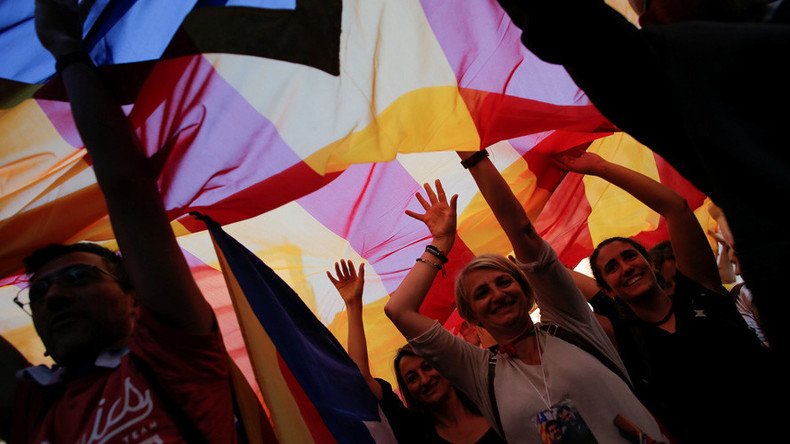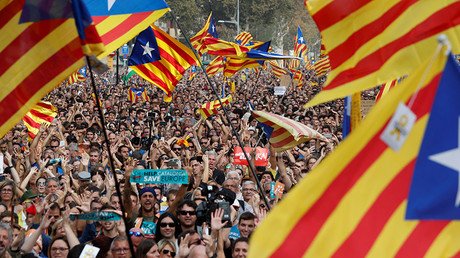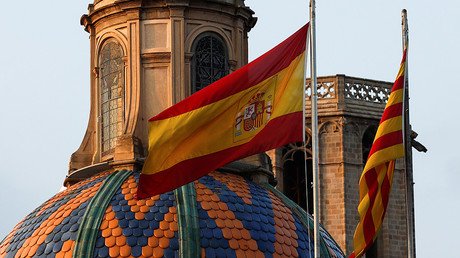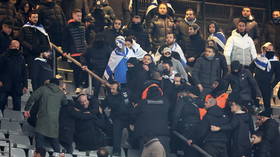‘Madrid can only act by force’: Spain & Catalonia on a collision course

The Catalan crisis is nearing its culmination as Madrid and Barcelona make bold moves against each other, increasing the possibility of a violent conflict and “tanks on the streets” of Catalonia, politicians and analysts warn.
Friday’s events in Spain represents the rubicon – with the Catalan Parliament unilaterally declaring independence and Madrid triggering constitutional Article 155, stripping Barcelona of its autonomy.
Follow LIVE UPDATES on Catalonia declaring independence
While the weeks of political uncertainty which followed the October 1 Catalan independence referendum – deemed illegal and void by Madrid – have apparently ended, recent developments raises even more questions over what lies ahead.
Spanish authorities won’t be able to fix the situation by only invoking Article 155, as Catalonia has already become an independent republic, Enric Folch, Secretary of the International section of the separatist Catalan Solidarity for Independence movement told RT.
“In Spain they want to remove the autonomy of Catalonia by Article 155, but actually there’s no autonomy in Catalonia, because Catalonia decided not to be inside of Spain,” Folch said.
“They can say that they void the autonomy of Catalonia but it doesn’t matter for us, because we will follow our own law, our own institutions our own Catalan Republic.”
Such a stance sets Barcelona on a collision course with Madrid, which can now only use force to keep the want-away region within Spain, Folch stated. He added that the time for dialogue has passed as Madrid has rejected all offers for talks.
“The only one thing they could do is to act by force, not by law as they’ve been acting before. They repelled absolutely all the law and all the Catalan petitions,” the separatist activist told RT.
While there are people within Catalonia who oppose independence, they have missed their chance to be heard by not participating in the October 1 referendum, Folch said, as only a fraction of those who made it to the ballot boxes, amid the massive Spanish police crackdown, voted against the move.
#Barcelona mayor condemns Friday's disorderly conduct by Unionist supporters – dubbed 'ultras' – in #Catalan capital https://t.co/pADQXSi6hNpic.twitter.com/vfVi9amBbc
— RT (@RT_com) October 27, 2017
Such an attitude, however, bears a fleur of “adventurism,” political commentator and journalist John Wight believes, as it effectively deprived the opponents of independence of their rights. The anti-independence crowd boycotted the referendum in compliance with Spanish laws, Wight told RT.
“They [the Catalan Government] are denying the democratic rights of opponents of Catalan independence within Catalonia of which we know there’re many, denying them their voice in this process,” Wight said.
“The referendum that was organized, supervised and held by the Catalan regional government. The independence leadership of Catalonia was boycotted by opponents of Catalan independence, abiding by the decision of the Spanish constitutional court that this referendum was illegal.”
The leaders of Catalonia’s separatist movement are following a dangerous path, ultimately playing into the hands of Madrid, which has already showed its resolve to “unleash violence against unarmed civilians,” Wight pointed out. Madrid’s approach is equally treacherous, he added.
“The Spanish constitution is invaluable, but when this Constitution is used just as a justification for unleashing body-armored Kevlar-helmeted riot police against unarmed civilians, the Constitution is not worth the paper it is written on,” Wight stated, referring to the violent crackdown on the October 1 referendum.
Spain and Catalonia are clearly heading for conflict now, and unless one, or both, takes considerable steps back, “tanks on the streets of Barcelona” seem to be a distinct possibility, Wight warned.
The European Union also bears responsibility for any potential violence, as it showed unanimous support to the Spanish government’s actions, Wight noted. “That has effectively given license to Mr. Rajoy to deploy these coercive methods and measures against the Catalan independence movement,” he said.














